Groundbreaking Discoveries
Brian Anderson is changing our understanding of attention in the hopes of creating a brighter future.
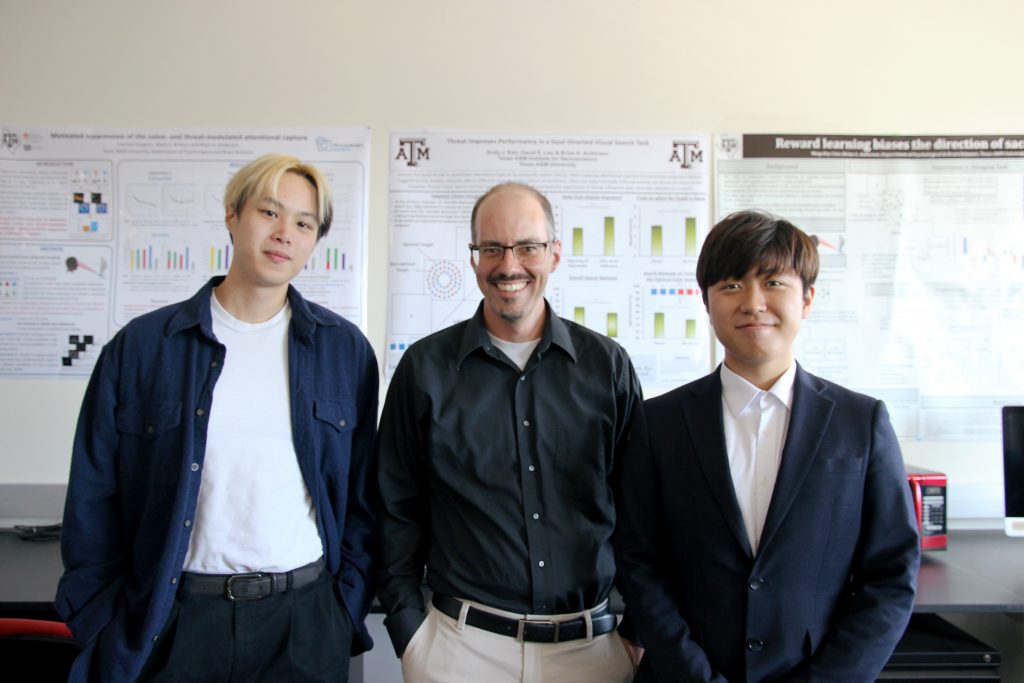
By Mia Mercer ‘23
Photos by Anna Burson ’24 and Rachel Knight ’18
According to psychological and brain sciences associate professor Brian Anderson, the brain is like an old house and scientists are like plumbers and electricians trying to figure out how everything works. But every once in a while, someone will discover a room that no one else has ever seen, and that room changes how you think about everything else, since it’s all connected. Discovering an unexplored “room” in the brain is exactly what Anderson did, and his original discovery has since become the heart of his scientific career.
After discovering that how learning influences attention is largely out of our control, Anderson’s research is changing our understanding of attention and has the potential to help solve things like obesity, substance abuse, ADHD, and PTSD. By investigating the mechanisms by which reward learning changes how we direct our attention in the future, Anderson continues to make groundbreaking contributions to science while influencing the lives of his students and lab members.
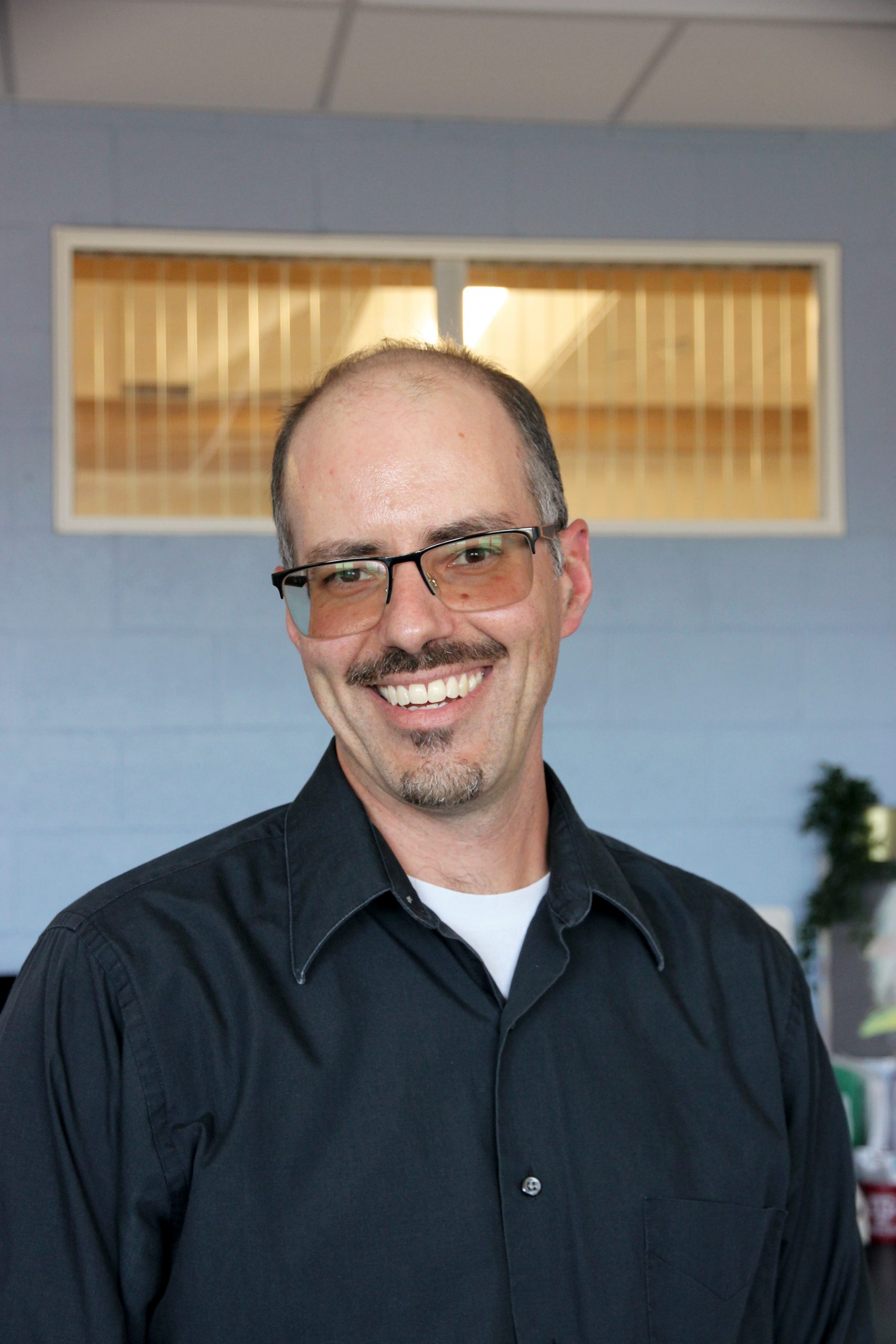
After discovering that how learning influences attention is largely out of our control, Anderson’s research is changing our understanding of attention and has the potential to help solve things like obesity, substance abuse, ADHD, and PTSD. | Anna Burson ’24
An Unconventional Beginning
Born and raised in Tenants Harbor, a rural fishing village in Maine, Anderson revealed he didn’t have the easiest childhood.
“When I was 12 years old I was diagnosed with paranoid schizophrenia and I struggled with OCD and depression from at least age 8,” Anderson shared. “I didn’t have much in the way of elementary school, middle school, or high school because I was in mental health treatment facilities basically from around age 12 to age 18.”
However, for a variety of reasons he does not completely understand, Anderson was able to make a full psychiatric recovery by the age of 19 and despite not having much of an education, he applied to the University of Maine at Augusta at the satellite campus in Thomaston.
“Before my fall into severe mental illness, I tested really strongly as an elementary student,” Anderson said. “Although the University of Maine at Augusta had a four-year program acceptance rate of about 99.4 percent, I contributed to the less than 1 percent that didn’t get in, presumably because I didn’t have any grades on my high school transcript. But since it was a state school, I could still take classes, most of which were attended by 12-20 people. I was sometimes the only person below the age of 30 in them. It was a very non-traditional education but that’s where I got my start in college.”
After graduating with a bachelor’s degree in social science, Anderson was eager to continue his scholastic journey and applied to several Ph.D. and master’s programs. However, he was rejected by all except two universities and decided to attend the master’s program at Villanova University, where he joined a lab that studied attention.
“For the first time in my life in that lab, I found something that I was really good at that wasn’t just taking classes,” Anderson said. “I always wanted to study perception because I always wanted to know ‘what went wrong?’ I had visual, auditory, and sometimes tactile hallucinations for some time, which was a highly unusual psychiatric case. So I was always interested in perception because, how is that possible? How does the perceptual system work?”
Although he was an impressive student, Anderson was not financially able to continue in his higher education after the first year at Villanova. But because of his outstanding work in the lab, Villanova offered Anderson a full scholarship and stipend to attend school, unaware of his financial situation.
“I can’t say for sure that my educational journey would have been permanently derailed if not for that scholarship, but it was certainly a real possibility,” Anderson said. “So I was able to finish the second year of school and do really good work in the lab, some of which was published which was ultimately my ticket to the Ph.D. program at Johns Hopkins University.”
After graduating with his Ph.D. from Johns Hopkins, Anderson wanted to continue conducting research at a research I (R1) institution, which is a research-focused institution with the resources to financially support top researchers. He applied for professorships at several universities that fit this category and ultimately found his place at Texas A&M University.
“Texas A&M was the first and at the time only school that would give me an offer,” Anderson shared. “They provided the resources I needed to do the kind of work I wanted to do. So my family and I moved to Texas and plugged into the work we were doing here, and it’s been a fantastic ride. I’ve never felt in want of what I need to do good science. I have a great lab, have been able to bring on a great team, I have enough resources to do techniques like functional brain imaging that are not very easily accessible, and we’ve done our best with what we have.”
Groundbreaking Discoveries
Since coming to Texas A&M, Anderson has not only been able to continue doing what he loves, but he’s conducting research based on an incredible discovery. His research reconceptualizes attention by examining three different control mechanisms rather than two, which was the norm before he entered the field.
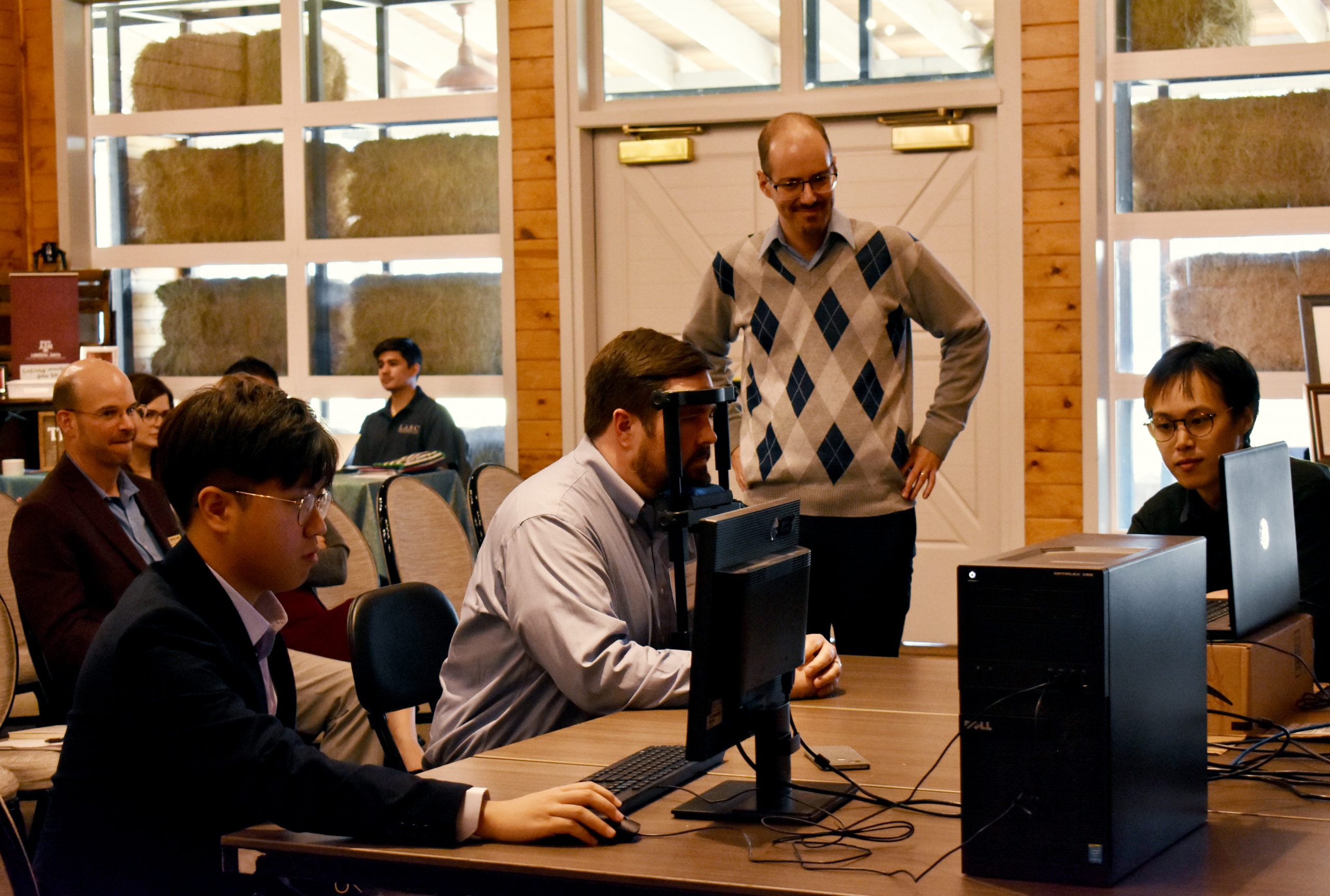
“A truly original idea can establish not only your career but your trainees as well,” Anderson said. | Rachel Knight ’18
“A truly original idea can establish not only your career but your trainees as well,” Anderson said. “Now, a lot of our subsequent ideas have been predicated on that one discovery. I’ve published about 90 papers now and my contribution to science is collectively rooted in one radically different way of thinking about the world in how the influence that learning has on your attention can be completely beyond your control.”
Anderson’s research takes a deeper look at reward learning and how it directly influences our control of attention.
“How reward influences what you pay attention to is largely outside of your control,” Anderson shared. “When I started studying at Villanova I came to quickly appreciate how central attention is to our mental lives. Attention determines what’s on your mind and the information you have access to within your mind. If you know what somebody pays attention to and why, you know what has the potential to influence their behavior. Trying to find why people pay attention to some things more than others is really fundamental to understanding why people think what they think and why people do what they do. When I got into that line of research, the role that learning played in the control of attention was dramatically underappreciated.”
According to Anderson, when people think about why they pay attention to something valuable, it’s often assumed that it’s because they want to and they’re intentionally looking for it or thinking about it. But the idea that someone could specifically not want something and yet automatically attend to it against their own will was a radical idea that made Anderson’s career and research.
“We have this automatic tendency to direct our attention to reward-related stuff and that had been well-known in the context of addiction for some time, but it was always thought to be a consequence of the brokenness that comes with addiction and what it does to your brain,” Anderson explained. “The idea that you can’t stop paying attention to these drugs, even though you know it’s bad for you and you want to stop, was thought to be reflective of a pathological, broken attention system. Whereas the research that I’ve done shows that’s actually just the way a normal human mind works. It’s amplified by drug reward and if the drug reward is an artificially strong reward, it’s going to have a stronger effect. But the general principle is that you have trouble not attending to reward-related things even though you may not want them anymore; it’s not just a drug thing.”
Drug addiction is one of the biggest motivators for Anderson’s research and in the hopes of creating a more effective approach in tackling addiction, his research has received funding from the National Institute on Drug Abuse.
“If you have ever struggled with a habit you can’t seem to kick, what I’m studying is at the heart of that struggle,” Anderson said. “I want to understand how we can break free of that mental tendency to keep going back. Attention is at the heart of who you are as a person. What you pay attention to is fundamental to understanding everything about what you know and what you feel and what you desire and what you choose to do whenever you make a decision. At the end of the day, I tend to think what I study tells me something very fundamental about what makes us human.”
The value of Anderson’s work has received impressive recognition. Anderson is a recipient of both the American Psychological Association (APA) Distinguished Scientific Award for Early Career Contribution to Psychology in the area of Perception and Motor Performance and the Association for Psychological Science (APS) Janet Taylor Spence Award for Transformative Early Career Contributions.
“To receive either of these two awards would alone be special, but the combination of the two is uniquely meaningful to me,” Anderson shared. “The APA honor recognizes one scientist in the area of perception and motor performance every two years and is part of a group of area-specific awards, whereas the APS honor recognizes a select few psychological scientists without respect to research area. That my research would have significant impact at both of those levels at the same time is humbling. It can be easy to get caught up in the daily grind, and these honors have helped me to step back a little and appreciate that the work my team and I do really does make a difference. That’s encouraging to me.”
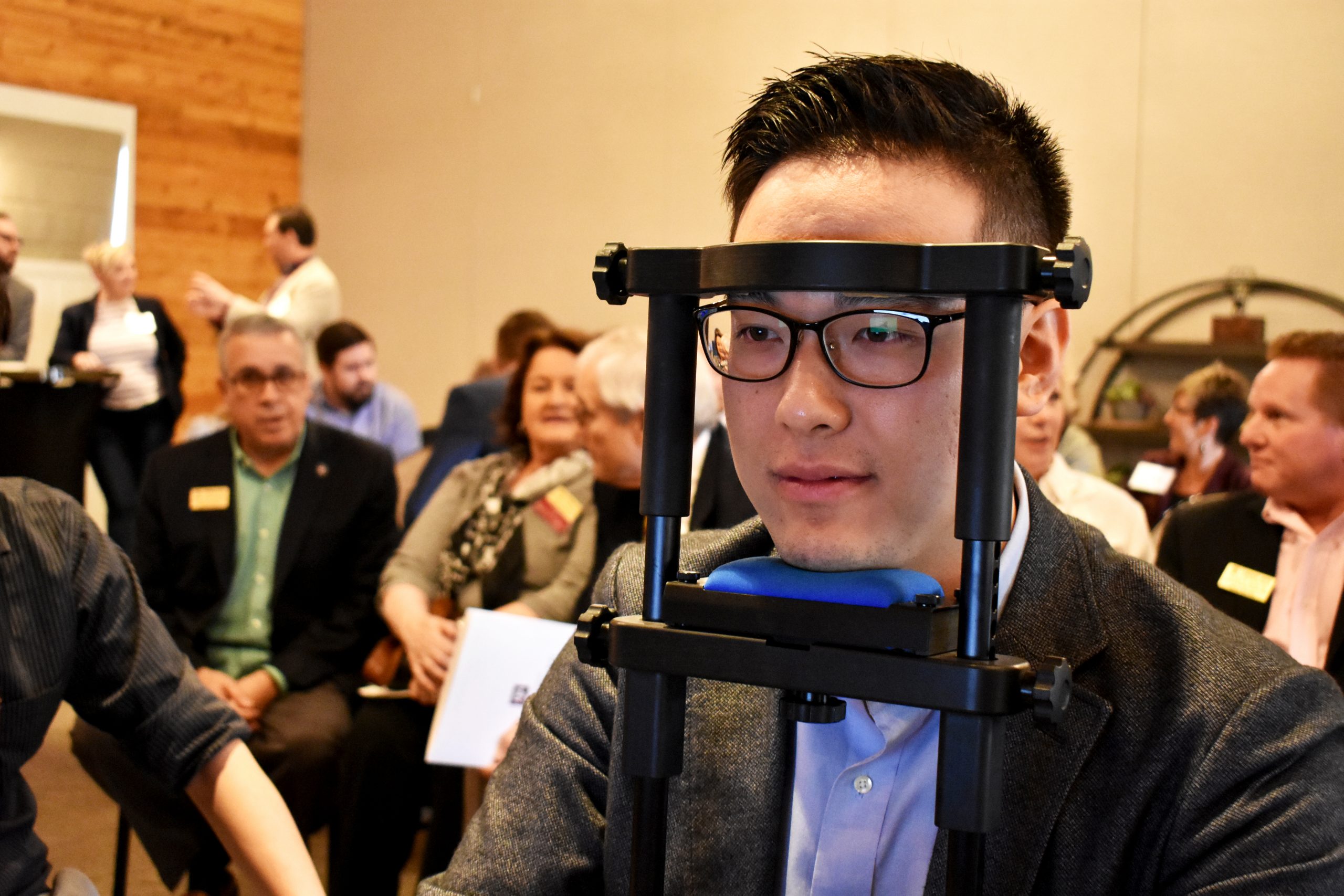
Not only is Anderson focused on developing his research, but he takes pride in mentoring his undergraduate and graduate students utilizing what he calls the “apprenticeship model.” | Rachel Knight ’18
Making a Lasting Impression
Not only is Anderson focused on developing his research, but he takes pride in mentoring his undergraduate and graduate students utilizing what he calls the “apprenticeship model.”
“For every student in my lab, the goal isn’t just for me to have somebody to help with the labor of doing research but to grow intellectually together,” Anderson shared. “We try to really help people grow as scientists at the undergraduate level and become more and more independent and generate more and more skills and we do this by working side-by-side with them.”
Now in his sixth year at Texas A&M, Anderson’s lab is active in more than 30 internal research projects and more than 50 total including collaborative efforts. Anderson said he is grateful for his team, because they help manage his research effectively.
“My graduate students and my postdocs are project-leaders who help me come up with ideas and they are absolutely pivotal to making those ideas happen in terms of developing the experiments and analyzing the data and putting it all together,” Anderson said. “I would be lost in mental outer space without my lab manager who’s the administrative glue of my lab. There’s also a team of over 20 undergraduate students. I wouldn’t be able to get all the research done without the fantastic efforts they put in just doing science. We wouldn’t be able to collect data nearly as fast if it weren’t for the amount of people we have to work with.”
For Anderson, the most rewarding aspect of the research experience is seeing the “lights come on” in his students’ eyes.
“I always look to bring someone to my team that brings something unique to the table or has a unique expertise in something that I’m not particularly strong in myself,” Anderson said. “And with undergraduate students, they’ll sometimes generate an idea which I help them refine. That guidance helps them learn to be a scientist. There are fundamental things that they need to be aware of and fully informed about when conducting research, like relevant prior literature and what the appropriate methodological techniques are that are going to give them an opportunity to really answer the question they want to in a way that will be convincing.”
Anderson said mentoring students and helping mold them into talented researchers is what he loves most about working in Aggieland.
“I just love the intellectual atmosphere,” Anderson said. “I’ve got fantastic colleagues who do really interesting stuff and have a lot of tools at their disposal that we can join forces around. I really appreciate the community, both the diverse expertise of the different faculty members and, from the students’ side, the commitment to service which really affects the community and culture here as well. That’s been one of my favorite things about being here.”
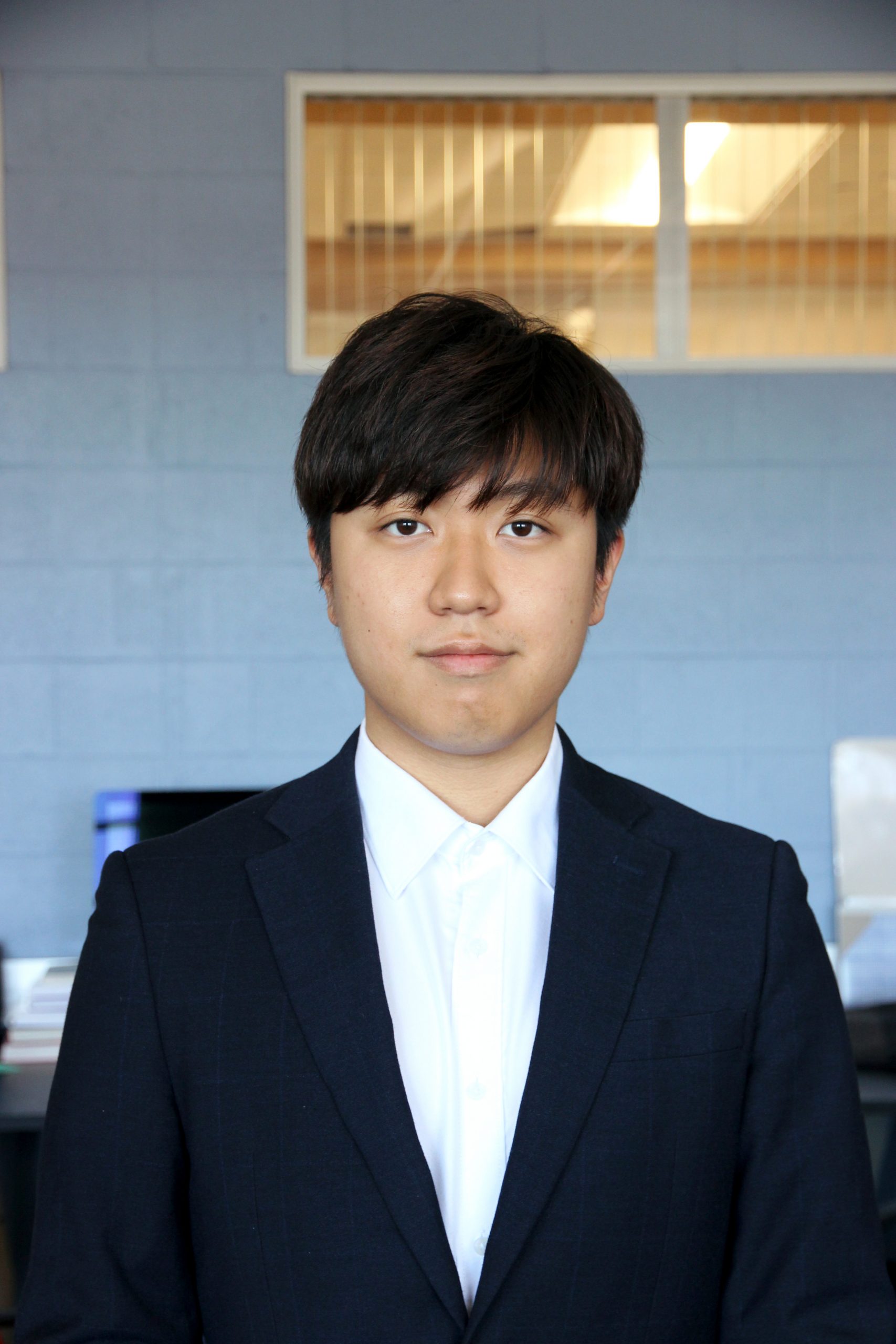
David Sangji Lee is one of over 20 undergraduate students working in Anderson’s lab. | Anna Burson ’24
Meet David Sangji Lee
As a first-generation college student, David Sangji Lee came to Texas A&M University with the hopes of becoming a medical doctor. But after working with Anderson in his lab, he was inspired to shift his focus to research.
“From my time in the lab, I have learned how to best approach a problem,” Lee shared. “If there is a problem with the questions I have, I know how to gather background knowledge, make a hypothesis, prepare the experiment, do it, and so on. This process can be applied from a research perspective and it can also be applied to other schoolwork and relationships with other people.”
One of over 20 undergraduate students in Anderson’s lab, Lee works hard to excel in his work and overcome the challenges he faces. Despite the large number of researchers in the lab, Lee said he is constantly amazed at how hard Anderson works to get to know each of his students and help them in their academic careers.
“He has evolved as a professor and as a mentor, and he is a person who cares about all the students he has,” Lee shared. “When people usually think of professors they think of them as authority figures or someone positioned farther from us as opposed to a friend or mentor, but he clearly breaks those types of stereotypes.”
Now in the home stretch of his undergraduate career, Lee encourages any student who wishes to pursue research or gain experience to start the process sooner rather than later.
“A lot of people ask when they should start research or when they should get ahead on post-school stuff and I usually tell them there’s no such thing as early,” Lee said. “If someone asked me ‘What are some choices that I regret?,’ starting my research earlier in my academic career would definitely not be one of them.”
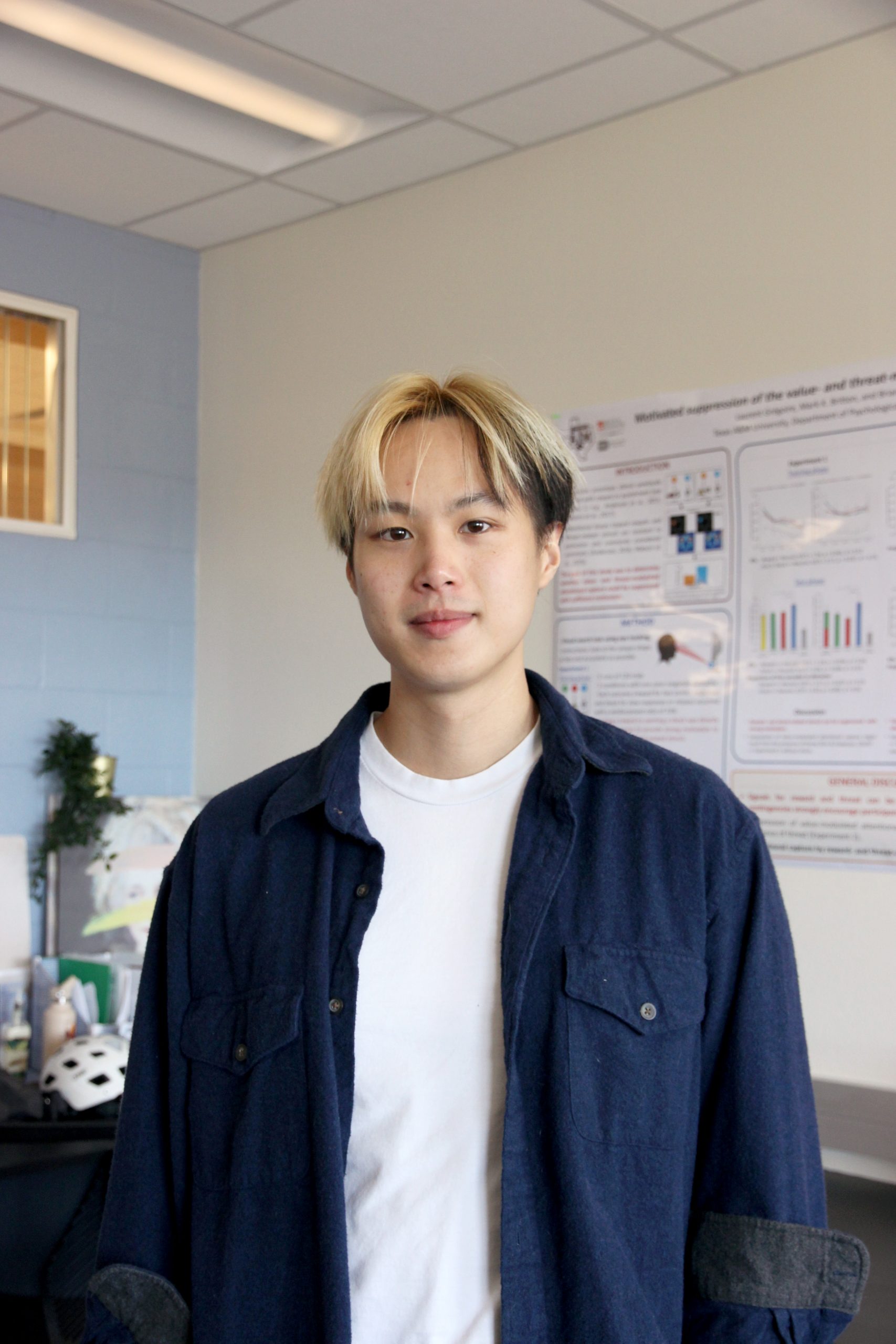
Ming-Ray Liao is a cognition and cognitive neuroscience Ph.D. student. He conducts his own projects and helps mentor undergraduate students alongside Anderson in his lab. | Anna Burson ’24
Meet Ming-Ray Liao
Ming-Ray Liao is a cognition and cognitive neuroscience Ph.D. student who works in Brian Anderson’s lab. Everyday Liao spends time reading articles, analyzing data, grant writing, programming, and mentoring. Now in his fourth year of graduate school, Liao said he has not only grown tremendously as a scientist but is also constantly researching what he loves with the help and guidance of Anderson.
“Brian is a really great boss, but then it’s not really like an employee/employer relationship,” Liao shared. “It’s more like a mentor/mentee relationship where I often come up with ideas and he guides me to something more feasible and more manageable. He’s an amazing mentor who gives a ton of advice on academic trajectory and how to balance different kinds of projects.”
Liao said the freedom he has in the types of projects he can choose to work on is what he loves most about the lab.
“Being able to think and talk science is something that I was able to learn well in the lab,” Liao explained. “It’s an environment where everyone is a researcher and everyone has different expertise and knowledge. Being able to talk with people like that and get inspiration is something you don’t really learn unless you’re immersed within the lab culture.”
Although Liao initially intended to be a scientific journalist, he was always curious about research. Since joining Anderson’s lab, Liao has been able to explore his curiosity and take his education to the next level while helping the undergraduate students he mentors.
“I teach a lot of workshops that help undergraduate students do and learn things before they leave the lab so they can do something on their own,” Liao said. “We’re trying to foster an environment where they can come and learn and get to know these topics a little more intimately compared to if you’re just doing one semester in the lab and collecting data. We want them to learn transferable skills from their experience, and Brian has been really conducive to that. He really supports all of this work and he’s always giving us opportunities. That’s something truly remarkable and nice to have in a mentor.”
